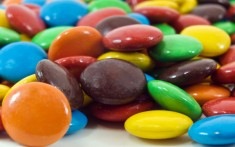NaturalSociety
September 24, 2012

Just when you thought the news couldn’t get any stranger regarding the disturbing state of the agricultural industry, it most certainly has. In an effort to slash costs and increase profits, livestock corporations have now begun feeding their cattle super cheap processed foods like cookies, gummy worms, chocolate, fruit loops and a whole list of candies. Fattening up the cattle thanks to a large percentage of sugar content and no real nutritional value, the disease-riddled cattle end up fetching a larger price for farm owners.
The fruit loops-fed cattle also may end up on your dinner table, harboring even more dangerous additives than even cattle fed a diet of corn. Before accounting for the new diet of cookies and candy, conventionally raised cattle meat contains oftentimes an excessive amount of antibiotics (now admitted to be harming human health internationally), artificial hormones such as Monsanto’s cloned growth hormone rBGH, resistant bacteria, genetically modified organisms (from corn) and other contaminants. Now, however, a few new problematic substances have entered the equation.
Cattle on a Diet of MSG, High-Fructose Corn Syrup, and GMOs
It is important to understand that almost all corn in the United States is genetically modified. Therefore, the ‘traditional’ factory farm diet of corn or grain is certainly not a safe option. It is, however, arguably better than 100% processed junk food that contains not just genetically modified organisms but ingredients like:
High-fructose corn syrup
MSG
Hydrogenated oils
Pesticides, herbicides, insecticides
Acrylamides
Artificial flavorings
Artificial colorings
Artificial sweeteners (like asapartame)
And many more. Each of these ingredients has of course been linked to a host of negative ailments ranging from cancer to cognitive disorders, however very few know the true dangers of such substances. High fructose corn syrup, for example, has been admitted to contain mercury — an element that is toxic in all forms. It is also important to note that the corn processed into high fructose corn syrup is, for the most part, always genetically modified. Such is also the case with aspartame, made from genetically modified bacteria waste. So now only are these cows being loaded up with processed food chemicals, mercury, and other additives, but they’re also still receiving GMOs.
Ice Cream Sprinkles As Food: “Anything that keeps the feed costs down.”
In other words, these cattle are being fed the typical American diet of processed foods containing GMOs, harmful additives, and zero real nutritional content. To give you a real life example, let’s examine one major dairy farmer who is literally feeding his cattle ice cream sprinkles. Dairy cattle owner Mike Yoder found a deal on ice cream sprinkles this summer, so he decided to go ahead and feed them to his cattle as their major food source. And as Yoder explains, it’s all about cutting costs — even if it means sacrificing your health:
“Anything that keeps the feed costs down.”
One candy producer, Brian Dill of Hansen Mueller, feels that it is justified feeding cattle chocolate, fruit loops, and ice cream sprinkles. According to Mueller, who markets the sale of chocolate to farmers as a way to cut costs, says that it really only comes down to ‘fat, sugar, and energy’. In other words, Mueller thinks it doesn’t matter what the cows eat. The only thing that matters to Mueller is that they get enough fat and sugar to maintain enough energy to be killed and shipped off to be eaten.
“That’s all it is,” he said.
The statements by this candy manufacturer rep and heads of the dairy cattle industry demonstrate the severe lack of care regarding the actual health of you and your family, the animals being fed these cheap processed foods, and the integrity of the environment. It also clearly shows that many such individuals are purely looking to increase profits, utilizing ‘anything’ that keeps costs down regardless of the price. In order to protect the health of you and your family, always remember to buy high quality organic. While 100% organic is the best along with locally grown market options, always look for the certified organic seal when purchasing food from a grocery store.






Leave a comment